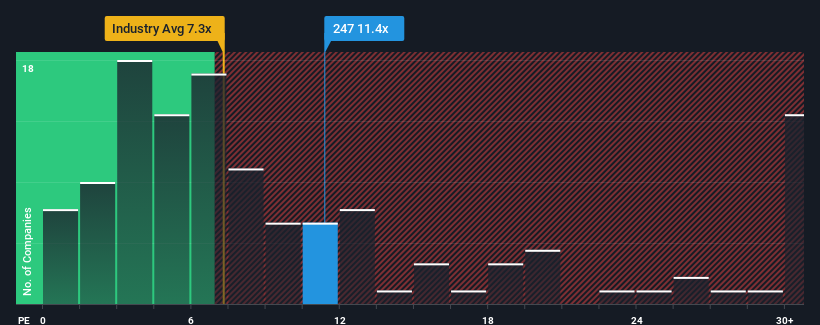- Hong Kong
- /
- Real Estate
- /
- SEHK:247
Tsim Sha Tsui Properties Limited's (HKG:247) Shares Not Telling The Full Story

There wouldn't be many who think Tsim Sha Tsui Properties Limited's (HKG:247) price-to-earnings (or "P/E") ratio of 11.4x is worth a mention when the median P/E in Hong Kong is similar at about 10x. While this might not raise any eyebrows, if the P/E ratio is not justified investors could be missing out on a potential opportunity or ignoring looming disappointment.
With earnings growth that's exceedingly strong of late, Tsim Sha Tsui Properties has been doing very well. It might be that many expect the strong earnings performance to wane, which has kept the P/E from rising. If you like the company, you'd be hoping this isn't the case so that you could potentially pick up some stock while it's not quite in favour.
Check out our latest analysis for Tsim Sha Tsui Properties

Does Growth Match The P/E?
The only time you'd be comfortable seeing a P/E like Tsim Sha Tsui Properties' is when the company's growth is tracking the market closely.
Taking a look back first, we see that the company grew earnings per share by an impressive 49% last year. Pleasingly, EPS has also lifted 2,846% in aggregate from three years ago, thanks to the last 12 months of growth. So we can start by confirming that the company has done a great job of growing earnings over that time.
Comparing that to the market, which is only predicted to deliver 21% growth in the next 12 months, the company's momentum is stronger based on recent medium-term annualised earnings results.
With this information, we find it interesting that Tsim Sha Tsui Properties is trading at a fairly similar P/E to the market. It may be that most investors are not convinced the company can maintain its recent growth rates.
The Final Word
Typically, we'd caution against reading too much into price-to-earnings ratios when settling on investment decisions, though it can reveal plenty about what other market participants think about the company.
We've established that Tsim Sha Tsui Properties currently trades on a lower than expected P/E since its recent three-year growth is higher than the wider market forecast. When we see strong earnings with faster-than-market growth, we assume potential risks are what might be placing pressure on the P/E ratio. At least the risk of a price drop looks to be subdued if recent medium-term earnings trends continue, but investors seem to think future earnings could see some volatility.
Plus, you should also learn about these 2 warning signs we've spotted with Tsim Sha Tsui Properties.
You might be able to find a better investment than Tsim Sha Tsui Properties. If you want a selection of possible candidates, check out this free list of interesting companies that trade on a low P/E (but have proven they can grow earnings).
If you're looking to trade Tsim Sha Tsui Properties, open an account with the lowest-cost platform trusted by professionals, Interactive Brokers.
With clients in over 200 countries and territories, and access to 160 markets, IBKR lets you trade stocks, options, futures, forex, bonds and funds from a single integrated account.
Enjoy no hidden fees, no account minimums, and FX conversion rates as low as 0.03%, far better than what most brokers offer.
Sponsored ContentValuation is complex, but we're here to simplify it.
Discover if Tsim Sha Tsui Properties might be undervalued or overvalued with our detailed analysis, featuring fair value estimates, potential risks, dividends, insider trades, and its financial condition.
Access Free AnalysisHave feedback on this article? Concerned about the content? Get in touch with us directly. Alternatively, email editorial-team (at) simplywallst.com.
This article by Simply Wall St is general in nature. We provide commentary based on historical data and analyst forecasts only using an unbiased methodology and our articles are not intended to be financial advice. It does not constitute a recommendation to buy or sell any stock, and does not take account of your objectives, or your financial situation. We aim to bring you long-term focused analysis driven by fundamental data. Note that our analysis may not factor in the latest price-sensitive company announcements or qualitative material. Simply Wall St has no position in any stocks mentioned.
About SEHK:247
Tsim Sha Tsui Properties
An investment holding company, invests in, develops, manages, and trades in properties primarily in Hong Kong, Mainland China, Singapore, and Australia.
Excellent balance sheet average dividend payer.


